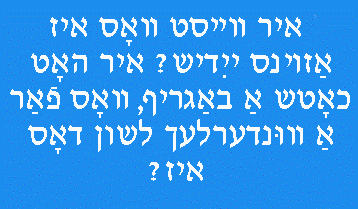YIDDISH
 Posted at mentalblog.com (thread: mendy-says):
Posted at mentalblog.com (thread: mendy-says):A: First, I have to make it abundantly clear that I am not a grammarian of the Yiddish language and never have purported to be. That is why I am careful to phrase my musings on Yiddish usage in form of questions to the imaginary "yiddishisten".Q: Berl, at what point does a usage of a Yiddish word become accepted enough to be "legalized"?
(ex.: זעהן-זען, איהם-עם etc)
With that disclaimer out of the way, let me say this:
1. It seems to me that the examples you site pertain more to the realm of spelling, for which, strictly speaking, there are no real (as in "old and established") rules. To the best of my limited knowledge on this subject, all Yiddish spelling rules are very recent conventions. (Earlier, on [mentalblog], we had a discussion on the old phonetic spelling of Yiddish). To me, the examples you site are merely different spellings of the same words that reflect different pronunciations of those words in different dialects. That should be always be "legal", regardless of what the spelling conventions and dictionaries say.
2. Now to the "meat" of you question. You ask: "at what point does a usage of a Yiddish word become accepted enough to be "legalized"?"
Given that Yiddish is a זשארגאן it would seem that כשמו כן הוא - it should have no "rules" at all. So if Yiddish speakers use a particular word – it should automatically be "legal". However, there is a serious wrinkle to that approach. In year 2005 we are not dealing with very many real native Yiddish speakers. Even the dwellers of "Williamsburg rat holes" - that do speak Yiddish to each other in their daily lives – speak a crude, simplified version, one that ignores gender subtleties and is void of rich old idiomatic expressions. With the young folk that speak Yiddish in CH – it is even worse. To anyone, that spent time listening to real old-world Yiddish speakers, it should be very clear that, at best, we are talking about a crude slang that is based on Yiddish. That being the case, it would seem to me that gender, case and conjugation mistakes commonly made by contemporary Yiddish speakers should not be viewed as acceptable "usage of the word".
berl, crown heights 06.21.05 - 10:29 am #
That was too long. Needs clarity. The answer depends on what the goal is.
If the goal is to be linguistically correct, then whatever the contemporary speakers do is, by definition, legitimate. If however, the goal is to preserve the language of the Jews of Eastern Europe - then it is not.
[If the goal is to be an ivri - to be "different" then the subtleties of old Yiddish should not matter. But I know for a fact that R’ Gish speaks a beautiful old Yiddish and is somewhat fanatical about it. Go figure.]
berl, crown heights 06.21.05 - 10:48 am #
And from another thread (Oy! for Reb Maishe, the Alter Rebbe’s son):
Who said Yiddish was dead?
here we have an exchange that is a fine specimen of New Yiddish - a.k.a."Yinglish". Thank G-d, lo almon Yisroel!
berl, crown heights 07.22.05 - 7:28 pm #


1 Comments:
This was the conversation that led up to it:
(Sorry for latin letters - technical reasons.)Hersheltzig wrote: "iz dos an unzere ingel?"
I believe the proper expression to be:
“iz dos unzere an ingel?”
Or is that Hungarian Yiddish? Yiddishisten to the rescue!
berl, crown heights | 06.19.05 - 7:51 pm | #
…my question: you put 'an' before 'unzerer'.
I suggested that it was supposed to go after, not before (and not in both places):
“iz dos unzerer an ingel?”
btw, the "reish" denotes gender.
berl, crown heights | 06.19.05 - 8:56 pm | #
Upon further reflection, I think it should really be as follows:
? איז דאס אונדזער אן אינגל
I do not think the word אונדזער has any other forms (it seems that אונדזערע and אונדזערער are both illegal usages).
Yiddishisten - to the rescue!
berl, crown heights | 06.20.05 - 7:50 am | #
Post a Comment
<< Home